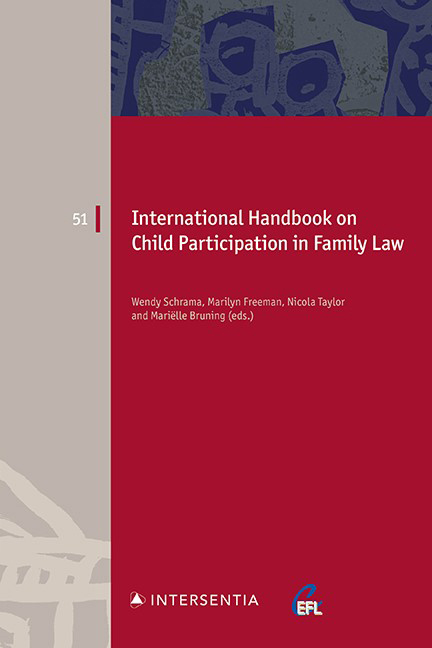Book contents
Belgium
Published online by Cambridge University Press: 10 December 2021
Summary
INTRODUCTION
This chapter provides an overview of child participation in the legal context of post-separation family proceedings according to Belgian law. In the Belgian family justice system, disputes during or after a separation or divorce in which children are involved fall under the competence of the family courts. The family courts consist of family chambers and chambers of friendly settlement, in which the judge seeks to bring the parties to an agreement. The family courts are competent for a variety of matters, which include adoption and filiation matters, proceedings concerning parental authority, residence arrangements, contact with the child and alimony.
About 36% of the Belgian population consists of married men and women, while 9% are divorced. 20% of the Belgian population are minors. In 2018, 45,059 marriages were registered in Belgium, as well as 23,135 divorces. In the same year, in the Flemish Region, nine out of 1,000 couples divorced. In the Walloon Region, this number was 12 out of 1,000, and in the Brussels Region 29 out of 1,000. The numbers were higher in 2000 and 2010. In 2014, it was estimated that in Belgium, children were involved in two out of three divorces.
Furthermore, in 2018, 38,921 partnerships were registered and 25,852 registered partnerships were dissolved. There are no reliable statistics on the number of non-registered relationships that came to an end, nor on the number of children involved in these separations.
In this chapter, firstly, the different modes of child participation according to Belgian law will be presented. In the second part, the focus is on the right of the child to be heard in the Belgian family justice system. Lastly, the representation of the child in family proceedings and the possibility for the child to initiate proceedings will be discussed. In this chapter, ‘child’ means a person who is a minor, i.e. who is not yet 18 years old.
STATUTORY PROVISIONS
There are different ways in which children can participate in family law proceedings. Children can have a substantive right to determine the outcome of the case, they can participate in judicial proceedings through the hearing of the child, and finally, they can be involved as a party to certain proceedings. The various modes of child participation are regulated by the Old Civil Code 10 and the Judicial Code. The right of the child to be heard is also enshrined in the Constitution.
- Type
- Chapter
- Information
- International Handbook on Child Participation in Family Law , pp. 103 - 120Publisher: IntersentiaPrint publication year: 2021



